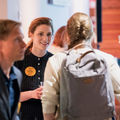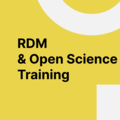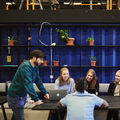Aalto Open Science Award Ceremony, May 7, 2024
Join us in celebrating the winners of the Aalto Open Science Award 2023!

AMAD is an innovative digital research platform for material sciences that integrates electronic notebooks, data management, procedure tracking, analysis tools, and automation software into one digital research workflow. Professor Patrick Rinke from Applied Physics, IT Application Owner and Project Manager Lara Ejtehadian and Solution Owner Ilari Lähteenmäki from Aalto IT services shared with us how AMAD’s research-driven development process has brought together a multi-disciplinary team to make open science easier.
AMAD is a data infrastructure for experimental & computational materials data. Simply it can be thought of as a Dropbox for scientists. It’s a way to exchange data for a specific type of research, but on AMAD you can also collect, visualize and analyze the data. It can be used by individual researchers as a digital notebook to document their research process, but the real purpose is to share that process and collaborate with others.
From the beginning, AMAD has been a researcher-driven effort. The features of AMAD have been developed based on needs and requests from researchers. There are many different types of material science data, different formats and metadata. Most user requests that we get are for supporting different data types. We don’t know a priori what researchers need, so we ask what data you have, and then we can incorporate it. Requests are then realised by a team of researchers, IT services and developers who work in close collaboration.
Our goal is to develop and provide a platform and tools that help researchers with open science so that their data is easily findable, reusable, and reproducible. By offering platforms such as AMAD, we hope to encourage and facilitate open science practices.
We had intended AMAD to be a platform for data sharing and data management. For data management, we wanted to make it easier to fulfill funder requirements, but AMAD hasn’t been adopted for that purpose as much as we had wished. The capabilities, such as the infrastructure for metadata, is there but we don’t yet have an agreed, grand metadata scheme for all the natural sciences. That’s a work in progress for the whole community.
Data volume is a challenge. All the data in AMAD must be stored on a server at Aalto University. So when someone asks, “can I upload all my data?” which might be several terabytes, we have to say we can’t accommodate this because it’s simply too much data. It’s also not feasible for the community to make absolutely all data open.
Generally, one of the challenges in research IT is finding a balance between following the needs of the researchers and the demands of funding organizations. There are some trends, like open science, that might create a sudden boost in the demand for certain services. We aim to predict these and prepare for them in advance. We are not in a position to push researchers to open science, but we can do our best to align funder demands with researcher needs.
Reducing security risks in open science involves practices including providing secure infrastructure for storing data, anonymization of personally identifiable information (PII) to protect privacy, and collecting only the necessary data required for research purposes. Also educating and training researchers, especially junior researchers, on data security and data management helps.
With regards to AMAD, one of the platform’s main purposes is to share data within your group and there are good permission controls for how this can be done. As the platform is used for material sciences, we don’t expect a lot of personal data. There we rely on researchers’ common sense and complying with regulations.
We would like to see a wider community that embraces AMAD: opening the platform up to other universities, utilizing it in teaching, integrating AMAD with virtual laboratories and having a steering group around the infrastructure to safeguard the close connection between the scientific community and IT services.
More broadly, we hope to start a dialogue about infrastructures that support research data. Everyone forgets that AI needs data – and we need platforms that provide the data. However, infrastructure is expensive, and somebody needs to provide the money. We were lucky that the AMAD pilot was supported by Aalto University and the Research Council of Finland. Currently, there’s nothing in the funding calls, and nobody talks about infrastructures. It’s difficult to develop a strategy if there is little awareness. AMAD is one solution we can offer. Worldwide everybody’s developing their own systems and solutions, but eventually we’ll all have to come together and join forces. For this we need to develop a bigger vision jointly with all the stakeholders.
This interview is a part of a series showcasing the Aalto Open Science Award winner and runners-up. We warmly welcome you to the Open Science award ceremony which will take place on the 7th of May 2024.

Join us in celebrating the winners of the Aalto Open Science Award 2023!

We interviewed professor Riikka Puurunen, head of Catalysis research group at the School of Chemical Engineering, who received an honorary mention in the first Aalto Open Science Award.

We interviewed the Intelligent Robotics Research Group with the Robotic Manipulation of Deformable Objects project, 3rd place awardees of the first Aalto Open Science Award.
The principle of openness is the key principle of science and research. At Aalto University, the most visible forms of open science are open access publications, open research data and metadata, and combining openness and commercialisation.

Aalto University offers comprehensive services, guidance, and support to help you manage your data efficiently. Explore our collection of resources and external links to boost your research.

Join Aalto University's Open Research Network for open-to-all training.

Meet your Data Agents — researchers offering hands-on support on data management.



